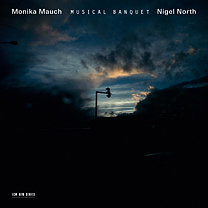Home » Jazz Articles » Album Review » Monika Mauch / Nigel North: Musical Banquet
EDITORIAL HOLD
This article requires author action before the editing process can be completed. Please contact editor once your changes have been made.
REASON: H. Smith 1/6/09 10:30 Made some corrections, including putting personnel and track listings in their proper location, adding cover art, and generally smoothing out a bit. Did a word count on it and it was over 700 words, so I cut out the second quote comparison but it's still about 120 words over the 500 word limit. I'll e-mail you about it.
Monika Mauch / Nigel North: Musical Banquet
The perfection of concept comes from the fact that A Musical Banquet was an anthology of songs for lute and voice from England, France, Italy, and Spain published under the name of Robert Dowland, John's son, in 1610. Most likely this publication was a collaboration. It was the first music publication of its kind assembling compositions in four different languages and styles.
The anthology contains no compositions by Robert Dowland, as his role appears to be one of assembly and editing. A Musical Banquet is comprised of ten English songs, four Italian, three Spanish and French and one lute solo (by John Dowland). The English songs are out of the ordinary save for the three Dowland songs, as they were composed by musicians not typically associated with this type of tune.
This music is beautifully antique, an aural wood etching of medieval life that could have served as an appropriate soundtrack for period movies like Elizabeth or A Man for All Seasons. Striking are Nigel North's interpretations of Dowland's solo lute performances, "Sir Thomas Monson, his Pavin and Galliard" and "Sir Robert Sidney, his Galliard." This music, both solo lute and vocal, is infused with a corporate melancholy that can be worn like a cloak.
North and soprano Monika Mauch deliver these ancient songs with fresh reverence that illuminates the paradoxically resigned urgency of these dower pieces. Mauch's voice is sharply defined yet warm, with little or no vibrato. As such, it conveys the tone and timbre of the longing in these songs. It also conveys a certain decadence, an indulgence of selfishness and wonton consumption. North's lute playing is precise and well studied. The sonics of the affair are captured in the rich warmth typical of ECM engineering.
Stylistically, an obvious parallel can be drawn between Dowland's music and that of American blues musician Robert Johnson (1911-1938) in the early 20th Century. Lyric subject matter is one intersecting element between these two types of songs (and all songs from all ages, for that matter). Love, death, sex, loss, longing, betrayal... all of these themes are present in these two genres.
Consider the Liebestod (love-death) of "Lady, If You So Spite Me:"
"If you seek to spill me, Come kiss me, sweet, and kill me. So shall your heart be eased, And I shall rest content and die, well pleased. "
Juxtapose this courtly love-sickness against Robert Johnson's savagely barren tale of fear and resignation in "Me and the Devil Blues:"
"Early this morning when you knocked upon my do' I said, hello Satan, I believe it's time to go Me and the devil, both walking side by side I'm gonna beat my woman, till I get satisfied."
The former song rings of unrequited love neither offered nor received where the latter reflects the paranoia and pain of love gone bad and thus, consumed. Both illuminate the storminess of emotion.
This is most timeless music that can be enjoyed on many levels or several levels at once.
Visit Monika Mauch and Nigel North on the Web.
Track Listing
Passava Amor Su Arco Desarmado (Love Walked By Unarmed); Lady, If You So Spite Me; Dovro Dunque Morire? (Must I Then Die?); Amarilli Mia Bella (My Fair Amaryllis); Si Le Parler Et Le Silence (If Words And Silence); Se Di Farmi Morire (If You Think To Cause My Death); O Eyes, Leave Off Your Weepingvuestros Ojos Tienen d'Amor (Your Eyes Hold I Know Not What Of Love); In A Grove Most Rich Of Shade; Lady Rich, Her Galliard; Go, My Flock, Go Get You Hence; O Bella Piu Che Le Stelle (Oh Fairer Than The Stars); My Heavy Sprite; Galliardto Plead My Faith; Ce Penser Qui Sans Fin Tirannise Ma Vie (This Thought Which Endlessly Governs My Life); O Dear Life, When Shall It Be?; Sir Robert Sidney, His Galliard; Change Thy Mind Since She Doth Change; Sir Thomas Monson, His Pavin And Galliard; Vous Que Le Bonheur Rappelle (You Whom Happiness Recalls); In Darkness Let Me Dwell; Sta Notte Mi Sognava (Last Night I Dreamed); Far From Triumphing Court.
Personnel
Monika Mauch: soprano voice; Nigel North: lute.
Album information
Title: Musical Banquet | Year Released: 2009 | Record Label: ECM Records
< Previous
You Know You're a Jazz Reviewer When...
Next >
Dancando Com Ale
Comments
Tags
For the Love of Jazz
 All About Jazz has been a pillar of jazz since 1995, championing it as an art form and, more importantly, supporting the musicians who create it. Our enduring commitment has made "AAJ" one of the most culturally important websites of its kind, read by hundreds of thousands of fans, musicians and industry figures every month.
All About Jazz has been a pillar of jazz since 1995, championing it as an art form and, more importantly, supporting the musicians who create it. Our enduring commitment has made "AAJ" one of the most culturally important websites of its kind, read by hundreds of thousands of fans, musicians and industry figures every month.



















